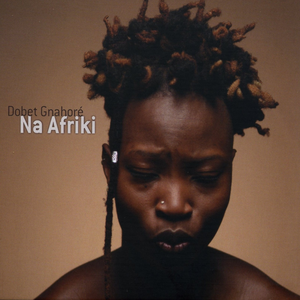It was within this Ivory Coast-based company that Dobet met French guitarist Colin Laroche de Féline. Having spent some time in the well-known Tché Tché dance company, Dobet decided with Colin (in 1999) to form a duo, Ano Neko, which means “Let’s create together“ in Bété language. The duo toured widely in France (1999-2000) where they settled temporarily. They also worked together on the creation with Ba Cissoko of “Le Cabaret Nomade“ and “L’Entre Deux Monde“.
When they returned to Abidjan in 2001, they took part in the MASA Off festival and, while they were there, recorded eight songs under the supervision of the late Marcellin Yacé.
In 2003, their artistic project refocused on Dobet Gnahoré and expanded when a backup vocalist and a percussionist joined them. They produced her first album entitled “Ano Neko“. This CD comprises songs recorded in Abidjan and others recorded in Belgium during the summer of 2003.
From Mandingue melodies to Congolese rumba, from Ivory Coast Ziglibiti to Cameroon Bikoutsi, from Ghanian High-Life to Zulu choirs, their compositions, carried along with jazz-like sounds, are varied and colourful. The sanza, the balafon, the calebasse and bongos are brought in to support the guitar, the vocal backup and Dobet’s warm and powerful voice...
Dobet sings in a range of African languages including Bété, Fon, Baoule, Lingala, Malinke, Mina or Bambara, thereby reproducing the Pan-African tradition of the Ki Yi Mbock group.
Inyembezi Zam
Dobet Gnahoré Lyrics
Jump to: Overall Meaning ↴ Line by Line Meaning ↴
Ndikhalin yembezi zegazi
Ndifunukufa ndidedwajwi
Kuba andifuni kushiya shiya
Na pha kati kwethu
Ukunceda abancinane
Nokubaleka kobobunzima
Ingulowo nalowo uzimelen dhwini
Dhwini dhwini
Ngamanyama xesha ndiyazibuza ukuba
Leliphina elilizwe ndipilakolo
Ayomélé langa kangakô
Ndisho imithi nomhlaba
Ayomele langa kangakô
Akomfou nou kou yen domyen nen
Ngaba en difunoukou yen obousso mougegobamon
Akomfou nou kou yen domyen nen
Ngaba en difunoukou yen
Ndifun kunya maiala andazukuba ninga
Balékélaphina balékélaphina
Ndifun kunya maiala andazukuba ninga
Senzamdaka ilizwé lethu.
Ilizwé lethu mama ko owe
Ndisho imithi nomhlaba
Ayomélé langa kangakô
(Sung in Xhosa (South Africa)
The lyrics to Dobet Gnahoré's song Inyembezi Zam are deeply emotional and expressive. The song is sung in Xhosa, which is a language spoken by the Xhosa people of southern Africa. The lyrics express a feeling of sadness and hopelessness, as the singer talks about being overwhelmed by her tears and wishing for death. She says that she does not want to leave her home, but she also feels a strong desire to help others who are suffering. The repeated phrase "dhwini dhwini" seems to represent the sound of her crying, emphasizing the depth of her pain.
The song also touches on themes of cultural heritage and connection to the earth. The singer talks about asking questions about her identity and feeling rooted in the land. She mentions "imithi nomhlaba," which means "trees and the earth" in Xhosa, suggesting that she draws strength and identity from the natural world around her. Overall, the song is a powerful reflection on the complex emotions of grief and the ways in which our cultural and environmental backgrounds shape us.
Line by Line Meaning
Ndiyeke ndife
I will let go and die
Ndikhalin yembezi zegazi
I cry tears of blood
Ndifunukufa ndidedwajwi
I long for death, my heart is heavy
Kuba andifuni kushiya shiya
Because I do not want to leave anything behind
Na pha kati kwethu
Here in the middle of us
Ukunceda abancinane
To help the little ones
Nokubaleka kobobunzima
To escape from difficulties
Akhomntu othenbe noncemelomnyé
There is a person who is hurting and needs comforting
Ingulowo nalowo uzimelen dhwini
Here and there are people suffering
Dhwini dhwini
Suffering, suffering
Ngamanyama xesha ndiyazibuza ukuba
At these dark times, I wonder
Leliphina elilizwe ndipilakolo
What is happening to this world?
Ayomélé langa kangakô
The sun has set like this
Ndisho imithi nomhlaba
I speak of the trees and the earth
Ayomele langa kangakô
The sun has set like this
Akomfou nou kou yen domyen nen
My heart is broken and my head is bowed
Ngaba en difunoukou yen obousso mougegobamon
Do you want me to give up and curse God?
Ndifun kunya maiala andazukuba ninga
I want to unite people so that we are not alone
Balékélaphina balékélaphina
Let them walk together, let them walk together
Senzamdaka ilizwé lethu.
We have to protect our land
Ilizwé lethu mama ko owe
Our land, oh mother
Ndisho imithi nomhlaba
I speak of the trees and the earth
Ayomélé langa kangakô
The sun has set like this
Writer(s): Dobet Gnahoré
Contributed by Callie A. Suggest a correction in the comments below.

@saturnoandromedoso4926
My mom used to play this song on our stereo wen I was a kid, thank u 4 your music
@sarmoyehamadoun2344
Sublime ❣️